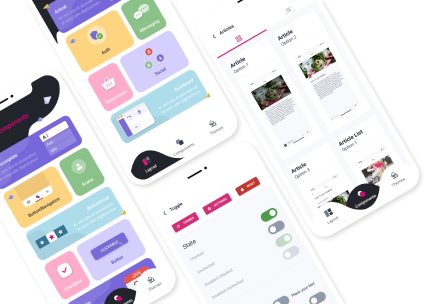How should you choose the first programming language for your project?
8 min readDon't you believe it's necessary to know how big you would like to build your house before making any conclusions? How many bedrooms do you require? Where would you like your house to be located? Would it be made of wood or brick?
The following may seem paradoxical depending on your expertise in the area. Still, it is important to remember that every technical item is developed in response to a non-technical demand. In software engineering, similar worries about the house are also present.
If we need to choose a programming language for a project, we must first ask a few questions before making any decisions. For instance, what type of undertaking is it? The application's scalability, complexity, developmental budget, development time constraint, application security, accessible resources, and so on.
The project team always hopes that the application will be around for the long haul, meeting the client's requirements even if industry change happens later.

It’s important to choose the first programming language correctly
Things to consider when choosing a programming language.
1. Application Types
You should have a clear goal. The type of app highly influences the language of choice. What type of application are you going to develop? Is it a web-based application? A mobile application? Embedded firmware or something else?
You must also evaluate the application's complexity or size. Some CMS systems, such as WordPress (needs PHP knowledge) or Umbraco (requires C# knowledge), can be used to build small applications such as web registration forms, portfolio slideshows, simple marketing web pages, or simple personal blogs.
For medium-sized projects including e-commerce platforms, internal enterprise apps, and IoT solutions, Java or C# can be employed.
- HTML/CSS and JavaScript are used in front-end development;
- C#, Python, or JavaScript for backend development;
- 2D game development uses JavaScript or C#;
- 3D game development uses C# or C++;
- Python, R, Clojure, and Julia are examples of data science/machine learning/analytics programming languages.
- FORTRAN, Matlab, APL, ALGOL, Julia, R, and C++ are examples of math and scientific computing languages.
- Scala, Java, R, Python and Clojure are examples of big data programming languages.
- C, C++ are the operating systems.
- C, Go, and Rust are examples of distributed systems.
2. Targeted Environment
Additionally, you must evaluate the platform on which you intend to run the program. Suppose you have two programming languages, Java and C. If you have built a C program and wish to run it on Windows and Linux, you will need to port it. In this situation, platform translators and two distinct executables are required.
In the case of the Java programming language, the bytecode would be generated, and in order to execute it on any machine, the Java Virtual Machine must be installed. The same is true for websites. It should appear and function identically across all browsers. If you employ CSS3 and HTML5 tags, your website may appear and function differently across browsers.
3. Maintainability
We have access to a library ecosystem and vendor support regardless of the chosen technology and language. We must consider the program's maintainability, which is why we should always examine the most recent version of both the language and technological stack. Ensure that anything we choose is current and remains for an extended period.
While developing an application, you must consider how you will interact with your users over the long term, and at some time, you will need to transfer the codebase to a new team.
Depending on the platform you will be working with, you will need to hire and pay for inside developers in your region, as well as for their maintenance. This regular maintenance will depend on the availability and expertise of the local development team.
4. Performance and Scalability
Programming language choice affects application performance. When the application framework isn't scalable, it matters. Choose the correct programming language to boost your app's performance.
How many users can your program manage, and what's going to happen if it grows? Will more users slow down your app? Will it kill your app? Scale your app. Can your app allow more add-ons without affecting its performance? The application's performance has been studied extensively. The results weren't concrete analyses of programming languages' performance.
5. Security

Each application has its own set of security requirements
When picking a programming language, you should also consider the security of your application. Each application has its own set of security requirements.
Healthcare-related apps, for example, require HIPAA compliance, whereas financial applications require PCI compliance. If you maintain an eye on the protection of your application, it will become more robust.
You must also safeguard your application against cyberattacks and hackers. Before selecting a coding language for your application, you must adhere to the security criteria.
6. Social Support
Many challenges will arise throughout the implementation of any program, which might be disastrous if there is insufficient community assistance. While developing an application, you may become stuck at any time and require the aid of specific resources or other developers. This is why you should focus on this aspect as well.
If you choose a language with few instructions or articles to help you learn, you will find it challenging to adapt and work on it. Before deciding on a programming language, it's a good idea to look at video courses, blogs, forums, and community support sites like GitHub, Reddit, Wikipedia, etc.
7. Development Timeframe
Every company desires to deliver the application as quickly as feasible. Additionally, business stakeholders expect new features or the program to be completed as quickly as feasible. This is why you should focus on this component, which is…development time.
You should select a programming language that enables rapid application development. If sufficient library tools, modules, or packages are available for a programming language, then you won't have to construct everything from scratch, hence reducing application development time.
Here, you must focus on the encounter in your preferred language. Less time will be required to develop software if you are conversant with the language. In other sayings, if a program is simple to learn, you won't spend much time learning it, writing code, and deploying your application to the server.
Why would people choose the wrong language?
There may come a moment when you discover that a project was not written in the best language possible, which is usually fine. Choosing a language always involves a trade-off between advantages and disadvantages. However, occasionally the advantages do not exceed the disadvantages, and you probably wind up with the incorrect language.
The term “wrong” can be intimidating. The objective is not to make an ethical declaration, but to examine the reasons that led to a certain event in order to spot different types of errors.
Group impact
The crowd seems to favor complex shows. We love the current hot language. “Trends,” “developer surveys,” “GitHub stars,” and other indicators inform our judgments.
Group impact is tied to authoritative bias, where we appreciate innovations proven by respected persons. Their strengths and weaknesses are unaffected. We observe a lot of pro-innovation bias in our community, where we ignore the benefits of older technologies. Whenever something starts coming out, we discard obsolete technology too quickly.
Future-denying
In general, we favor immediate rewards to delayed, larger ones. Our perspective on projects is usually restricted to the time preceding launch, which we would like to happen as soon as possible. However, we must keep in mind that the time post launching is longer than the period before, and we risk wasting a significant amount of time on troubleshooting and maintaining if we begin with the wrong tool.
So, while time to market is crucial, it should not force us to move to manufacturing with our prototypes. And, whichever language we use for prototyping, it is always possible to switch to one that is greater time-consuming but also more robust.
Some Quick Pointers
When selecting programming languages becomes crucial, the ecology, the society, and the accessibility of programmers are factors to consider.
Many developers make the mistake of selecting programming languages based only on their popularity, fashion, and coolness. Choosing Lisp for a project because it is a highly clean and attractive functional language may prove to be a mistake in the long run. Therefore, it is wise to avoid this error
The programming language should be chosen based on business requirements, not because it offers syntactic sugar or is trendy. Perhaps you believe that, as the developer, it should be entirely up to you to develop any language. Only you have the flexibility to choose whatever technology you like, but this will not work in an IT department and could backfire on you.
As a project manager, you must first pay close attention to all the project's moving parts. You should understand all the elements for a clearer perspective, since this will assist you choose a programming language. A clear perspective at the outset of a project facilitates the selection of a practical programming language, resulting in less time spent on project maintenance, scalability, and security in the future.
If you can create good code in Java, C#, Python, PHP, or any other programming language, you can also write awful code in these languages. No common language is optimal for software development. Some programming languages and platforms are more suited for specific projects than others.

The programming language should be chosen based on business requirements
Winding-up
Choosing the first programming language need not be challenging. Before embarking on a project, do some research. Let's review these steps discussed in this post.
Determine your “what” & “why” and establish a clear objective.
Select the area in which you wish to specialize.
Define security methods and whether they are easy to maintain?
Define project execution time limits that must coincide with language complexity.
With these essential programming languages and elements in mind, you can make an informed opinion regarding the programming language you employ. It is beneficial to evaluate the languages using the above criteria in order to select the best one for the project. Let’s contact Groove Technology for further support!









